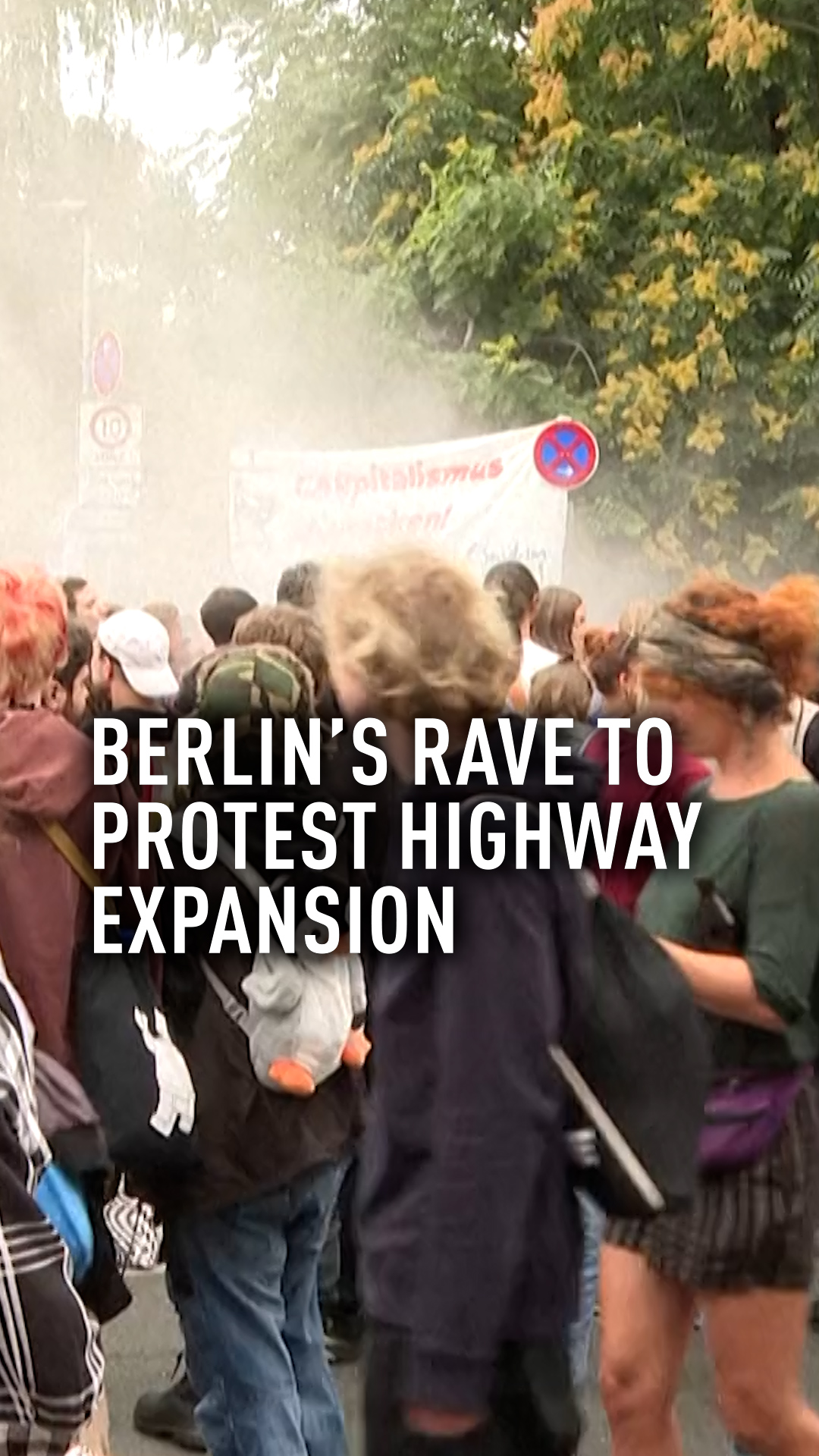00:59

Berlin demonstrators shut down one of the city's main roads on Saturday, transforming it into a kilometer-long rave in protest against a motorway expansion project that threatens to destroy scores of the the German capital's world-renowned clubs.
Thousands of climate activists, clubbers and locals could be seen partying along the street in the eastern Berlin district of Friedrichshain after several of the area's clubs announced they would block the busy road, replacing its usual traffic with makeshift stages for music. Authorities permitted the protest.
The demonstrators are trying to stop the expansion of Berlin's main motorway, the A100, which if built, would rip through the city's center, meaning the destruction of one of its most important neighborhoods for nightlife.

Participants dance during a protest rave against the A100 motorway expansion that threatens the existence of several of Berlin's clubs. /Michele Tantussi/AFP
Participants dance during a protest rave against the A100 motorway expansion that threatens the existence of several of Berlin's clubs. /Michele Tantussi/AFP
The six-lane highway means that 20 of Berlin's most popular clubs and cultural venues would be completely demolished, including About Blank, Wilde Renate, Else, and Club Ost.
"These are clubs that have existed here for the last 20 to 30 years," said Lutz Leichsenring, spokesperson of the club commission in Berlin.
Pointing to the cultural importance such locations have played in rebuilding the city's reputation since the fall of the Berlin Wall, he says the project would rid the city of what makes it so special.
"It's what makes Berlin famous, it's what makes Berlin so lovable," he says.
READ MORE
Berlin's May Day protests keep police on their toes
Berlin's green future on the line in binding referendum
Abandoned Berlin airport reopens as refugee center
It's not only the potential destruction of the city's cultural infrastructure, which has for years attracted travelers to the capital, that has angered detractors of the highway's expansion.
"We are right in the climate crisis at this moment. We don't need more cars, more highways,” says one protester, Adrian Schmidt.
Clara Duvigneau, spokesperson for the youth-led climate strike movement Fridays for Future, points out that one of Germany's biggest emitters is the transport sector, saying that extending its roads would be a significant step backwards in fighting the climate emergency.
"If we want to meet the climate targets by 2030, we would have to reduce our emissions by 14 times what they are doing now. That means this project is absolute fossil fuel madness and we have to stop it," she says.

Thousands took part in the protest rave. /Michele Tantussi/AFP
Thousands took part in the protest rave. /Michele Tantussi/AFP
The East Berlin area had been left undeveloped for decades – in part due to the plans to extend the A100, which critics say is the only reason why the clubs were allowed to set up in the first place.
After German reunification in 1991, Berlin had to find a way to meld the transport systems of East and West, with plans for the extension starting as early as in 1999. But the protest over the A100, one of Germany's busiest motorways, is part of a wider standoff over the use of cars in Berlin and the future of the city.
Right-wing politicians still want more roads and better conditions for motorists, but detractors say such an approach is completely out of step with other Western capitals that are trying to reduce car reliance, and inconceivable if Germany is going to reach its climate goals.
Beyond that, the argument is also about the fast-changing face of what used to be one of Europe's most progressive capitals, as rampant redevelopment continues to see more of the city's cultural spaces shut down.
"It's part of German culture, the culture of Berlin and this is a place where people have so many memories,” laments Carole Canale, a French marketing manager who joined the rave protest.
Invoking the importance of cultural expression and freedom to the city's identity, she says the death of Berlin's clubs will destroy a large part of what makes the city so special.
"It will be very sad if all this closes," she says.

Subscribe to Storyboard: A weekly newsletter bringing you the best of CGTN every Friday
Source(s): AFP